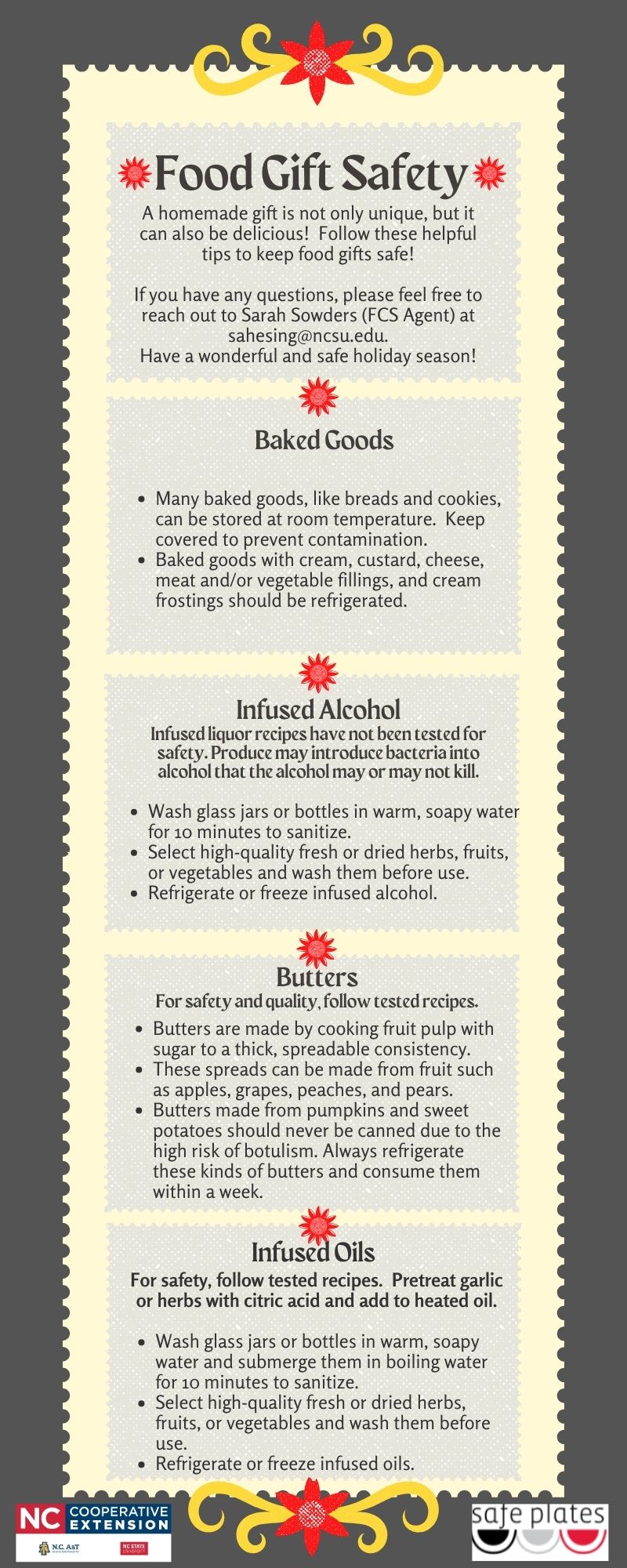Holiday Wellness: Food Safety When Gift Giving
go.ncsu.edu/readext?974043
en Español / em Português
El inglés es el idioma de control de esta página. En la medida en que haya algún conflicto entre la traducción al inglés y la traducción, el inglés prevalece.
Al hacer clic en el enlace de traducción se activa un servicio de traducción gratuito para convertir la página al español. Al igual que con cualquier traducción por Internet, la conversión no es sensible al contexto y puede que no traduzca el texto en su significado original. NC State Extension no garantiza la exactitud del texto traducido. Por favor, tenga en cuenta que algunas aplicaciones y/o servicios pueden no funcionar como se espera cuando se traducen.
Português
Inglês é o idioma de controle desta página. Na medida que haja algum conflito entre o texto original em Inglês e a tradução, o Inglês prevalece.
Ao clicar no link de tradução, um serviço gratuito de tradução será ativado para converter a página para o Português. Como em qualquer tradução pela internet, a conversão não é sensivel ao contexto e pode não ocorrer a tradução para o significado orginal. O serviço de Extensão da Carolina do Norte (NC State Extension) não garante a exatidão do texto traduzido. Por favor, observe que algumas funções ou serviços podem não funcionar como esperado após a tradução.
English
English is the controlling language of this page. To the extent there is any conflict between the English text and the translation, English controls.
Clicking on the translation link activates a free translation service to convert the page to Spanish. As with any Internet translation, the conversion is not context-sensitive and may not translate the text to its original meaning. NC State Extension does not guarantee the accuracy of the translated text. Please note that some applications and/or services may not function as expected when translated.
Collapse ▲Food Safety Gift Giving Guide
A homemade gift is not only unique, but it can also be delicious! Follow these helpful tips to keep food gifts safe!
Baked Goods
- Many baked goods, like breads and cookies, can be stored at room temperature. Keep covered to prevent contamination.
- Baked goods with cream, custard, cheese, meat and/or vegetable fillings, and cream frostings should be refrigerated.
Infused Alcohol
Infused liquor recipes have not been tested for safety. Produce may introduce bacteria into alcohol that the alcohol may or may not kill.
- Wash glass jars or bottles in warm, soapy water for 10 minutes to sanitize.
- Select high-quality fresh or dried herbs, fruits, or vegetables and wash them before use.
- Refrigerate or freeze infused alcohol.
Butters
For Safety and Quality, always follow tested recipes.
- Butters are made by cooking fruit pulp with sugar to a thick, spreadable consistency.
- These spreads can be made from fruit such as apples, grapes, peaches, and pears.
- Butters made from pumpkins and sweet potatoes should never be canned due to the high risk of botulism. Always refrigerate these kinds of butters and consume them within a week.
Check out the National Center for Home Preservation for Tested Butter Recipes: National Center For Home Preservation Tested Butter Recipes
Infused Oils
For safety, follow tested recipes. Pretreat garlic or herbs with citric acid and add to heated oil.
- Wash glass jars or bottles in warm, soapy water and submerge them in boiling water for 10 minutes to sanitize.
- Select high-quality fresh or dried herbs, fruits, or vegetables and wash them before use.
- Refrigerate or freeze infused oils.
If you are new to infusing oils check out this great resource from NC STATE: Infused Oils
If you have any questions, please feel free to reach out to Sarah Sowders (FCS Agent) at sahesing@ncsu.edu.
Have a wonderful and safe holiday season!
N.C. Cooperative Extension is an equal opportunity provider.
Read more at: https://evaluation.ces.ncsu.edu/statements/




 Food Gift Safety Flyer
Food Gift Safety Flyer